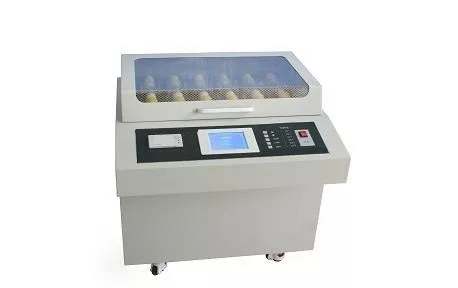Ensure Electrical Safety and Performance with a Breakdown Voltage Tester KBV/T/40
In the realm of electrical engineering and manufacturing, the reliability and safety of insulating materials are paramount. The Breakdown Voltage Tester KBV/T/40 is an essential tool used to evaluate the dielectric strength of electrical insulation. By determining the voltage at which an insulating material fails and allows current to pass through, this test ensures that materials can withstand operational stresses without breaking down. Whether you’re working in power generation, electronics, or material science, a Breakdown Voltage Tester is critical for quality assurance and compliance with industry standards. This guide delves into the key features, benefits, and applications of Breakdown Voltage Testers.
What is a Breakdown Voltage Tester?
A Breakdown Voltage Tester, also known as a dielectric strength tester, is an instrument used to measure the voltage at which an insulating material loses its insulating properties and begins to conduct electricity. This measurement is crucial for understanding the material’s ability to withstand electrical stress in real-world applications. The test involves applying an increasing voltage to the material until a breakdown occurs, providing a precise indication of its dielectric strength.
Types of Breakdown Voltage Testers
- AC Breakdown Voltage Testers: These testers apply alternating current (AC) voltage to the material, simulating real-world electrical conditions in many applications.
- DC Breakdown Voltage Testers: These testers apply direct current (DC) voltage, which is particularly useful for testing certain types of materials and components that operate under DC conditions.
- Portable Breakdown Voltage Testers: Compact and portable models designed for on-site testing, offering convenience without sacrificing accuracy.
Key Features of Breakdown Voltage Testers
- High Precision Measurement: Provides accurate and repeatable measurements of breakdown voltage, ensuring reliable evaluation of dielectric strength.
- Adjustable Voltage Ranges: Allows users to customize the test voltage to match the specific requirements of different materials and standards.
- Automated Testing Procedures: Many testers come with automated features, including programmable voltage ramps and automatic shutdown upon breakdown, enhancing safety and efficiency.
- Safety Features: Equipped with safety interlocks, emergency stop buttons, and insulation shielding to protect operators during high-voltage testing.
- Data Logging and Analysis: Advanced models offer data logging capabilities, allowing users to store, analyze, and export test results for further examination and documentation.
- Compliance with Standards: Designed to meet international testing standards, such as IEC, ASTM, and ISO, ensuring that the test results are universally accepted.
Benefits of Using a Breakdown Voltage Tester
- Enhanced Material Performance: Ensures that insulating materials can withstand operational voltages without failure, improving the overall safety and reliability of electrical systems.
- Compliance with Regulatory Standards: Helps manufacturers meet industry and safety regulations, reducing the risk of product recalls and compliance issues.
- Cost-Effective Quality Assurance: Identifies potential material failures before they occur in the field, preventing costly breakdowns and downtime.
- Versatile Applications: Suitable for testing a wide range of materials, including plastics, rubbers, oils, and gases, making it a versatile tool in various industries.
- Improved Safety: By testing the dielectric strength of materials, Breakdown Voltage Testers help prevent electrical hazards, ensuring the safety of both products and users.
- Efficient Testing Process: Automated and user-friendly features allow for quick and efficient testing, increasing laboratory productivity and throughput.
Applications of Breakdown Voltage Testers
- Electrical Insulation Testing: Evaluates the dielectric strength of materials used in cables, transformers, capacitors, and other electrical components to ensure they can withstand high voltages.
- Material Development: Assists in the development and testing of new insulating materials, providing critical data for improving product performance.
- Quality Control: Integral to quality assurance processes in manufacturing, ensuring that all products meet the required electrical standards before reaching the market.
- Power Generation and Distribution: Ensures the reliability of insulating materials used in power generation plants and distribution networks, reducing the risk of electrical failures.
- Aerospace and Automotive Industries: Tests the durability of insulating materials used in high-stress environments, such as aircraft and vehicles, where safety is critical.
- Laboratory Research: Used in academic and industrial research labs to study the dielectric properties of new materials and advance the field of material science.
Choosing the Right Breakdown Voltage Tester
When selecting a Breakdown Voltage Tester, consider factors such as the voltage range, type of material being tested, compliance with industry standards, and the level of automation required. Consulting with manufacturers or industry experts can help you choose the best tester for your specific needs.
Conclusion
Breakdown Voltage Testers are vital tools for ensuring the safety, reliability, and performance of insulating materials in electrical applications. Their precise measurements, adherence to industry standards, and versatile applications make them indispensable in manufacturing, quality control, and research. By investing in a high-quality Breakdown Voltage Tester, you can enhance product safety, improve material performance, and maintain compliance with regulatory standards.
For expert advice on selecting the best Breakdown Voltage Tester for your needs, contact our specialists today.





Reviews
There are no reviews yet.